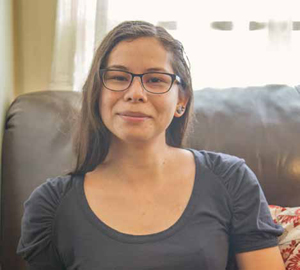Campus News
Alumni Profile / Alejandra Vargas: A light in the darkest hours
For 11 months, Alejandra Vargas and her father lived in half of a tiny garage. Her father, an electrician who often worked seven days a week, slept in a blanket on the floor. Vargas was 17 then, and living through one of the hardest times in her life.

For 11 months, Alejandra Vargas and her father lived in one-half of a tiny garage. The room held only a mini-fridge, a twin mattress, and an alarm clock. Her father, an electrician who often worked seven days a week, slept in a blanket on the floor.
Vargas was 17 then, and living through one of the hardest times in her life. She had been diagnosed with Ewing’s Sarcoma, an aggressive cancer that generally affects young people, and it had forced the removal and reconstruction of four of her ribs. But doctors told Vargas unless she had chemotherapy, the cancer might come back.
So Vargas, who was born in Los Angeles, and her father, a naturalized U.S. citizen, left their family behind in Tijuana, Mexico, and moved to San Diego for her treatments.
The $100-a-month garage was all they could afford.
At 25, Vargas is now cancer-free, but the lesson she learned from that time, she says, is what helped guide her into her current work. Today, Vargas is a suicide crisis line program coordinator for Suicide Prevention Services, where 400-500 lonely, lost, or suicidal people call in for help every month.
“I am really lucky to be alive,” says Vargas (Kresge ’12, Latin American and Latino studies, literature), “but not everyone thinks that, or they feel their life is hopeless. I want to help them recognize a little bit of that hope.”
Vargas’s life has mostly been an uphill climb. She was a shy girl whose cancer made her even more introverted. In order to support herself while attending San Diego City College, she worked 20-40 hours a week at the county’s animal shelter. At UCSC, she received a few grants, got loans, and held down two jobs in order to pay for her schooling.
But Vargas says there was a part of her that always wanted to give back to her community—although work and the cancer made that hard to do for a long time.
So when a job overseeing the 80 volunteers who staff Suicide Prevention’s 24-hour crisis line opened, Vargas knew she had found her niche.
While the Centers for Disease Control estimates an average of 105 people a day die of suicide in the U.S., Vargas says she had her own brush with the experience. In college, a friend called and threatened to harm himself. Vargas spent eight frightening hours trying to convince him to live.
“It wasn’t until later that I found out there were things like suicide hotlines,” Vargas says. “If I had know that, I wouldn’t have felt so alone.”
Her work now consists of supporting volunteers who, like she did, help those struggling with hard times and thoughts of selfharm. She also arranges training sessions and does outreach in order to break the stigma and secrecy around suicide so more people can get help.
“I feel like I am definitely giving back to the community that educated me,” Vargas says.
Her supervisor, Assistant Program Director Rosalina Valdez, calls Vargas hard-working, resilient, and determined.
“With everything she has gone through and at her age,” Valdez says, “there is a sense of responsibility, maturity, and a zest for life that is incredibly impressive to me.”